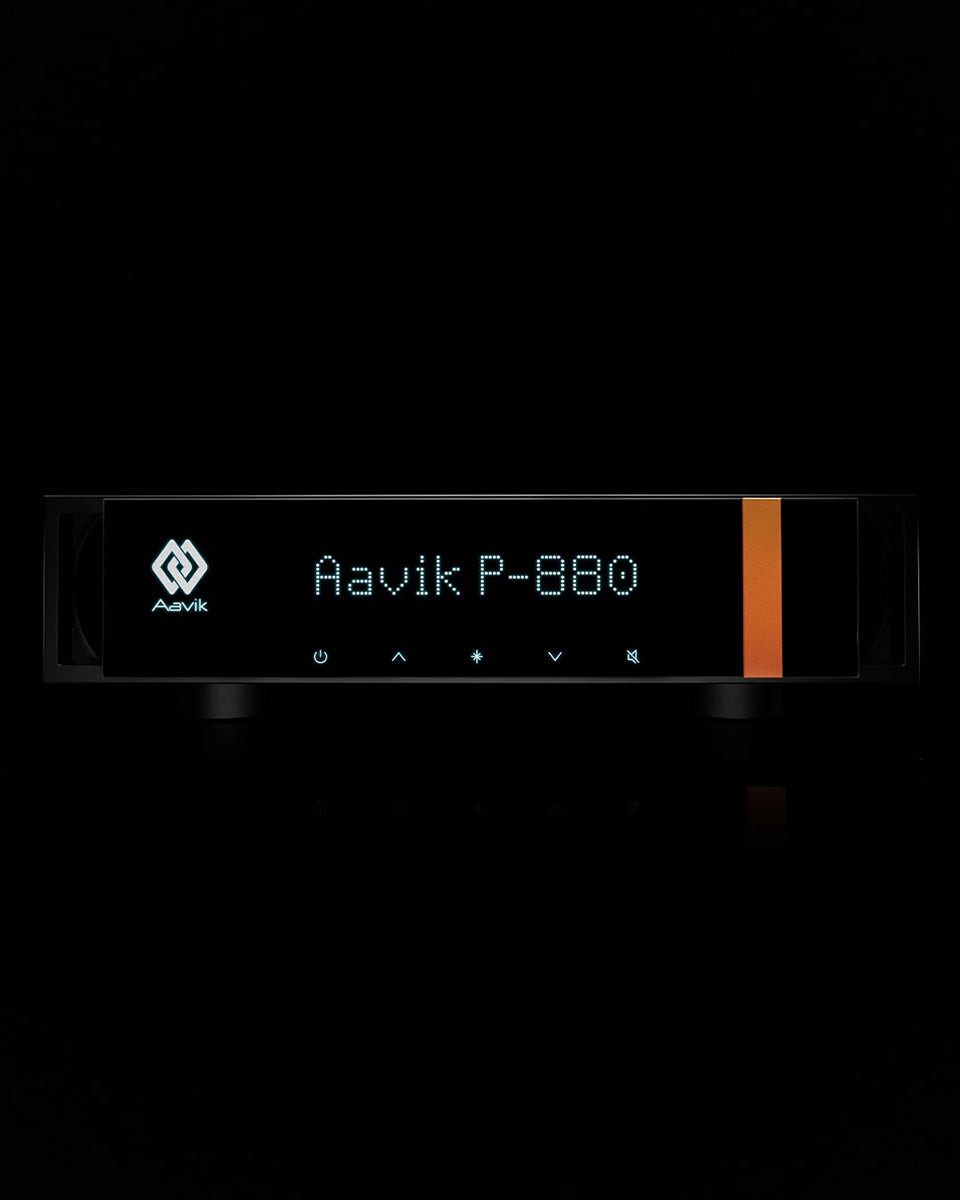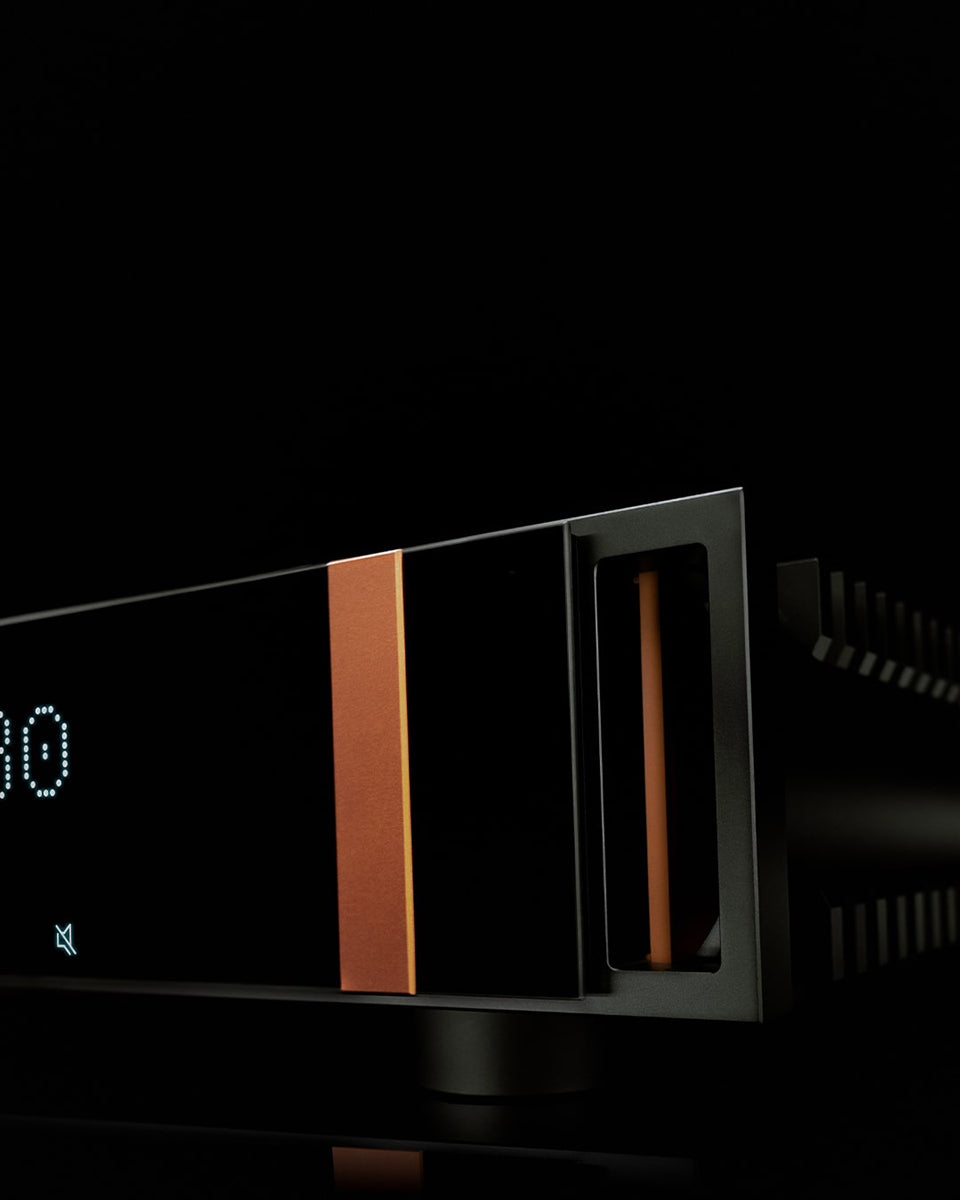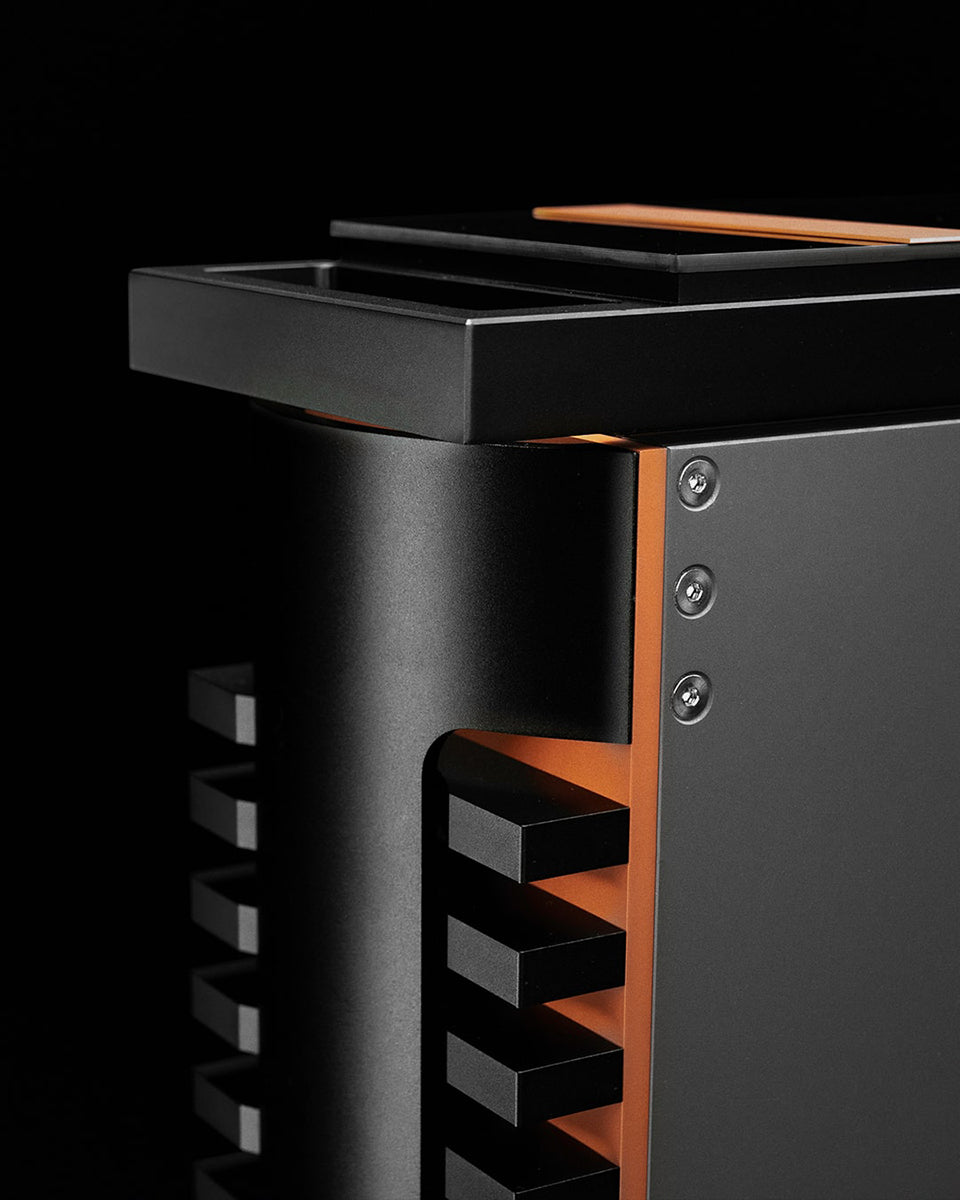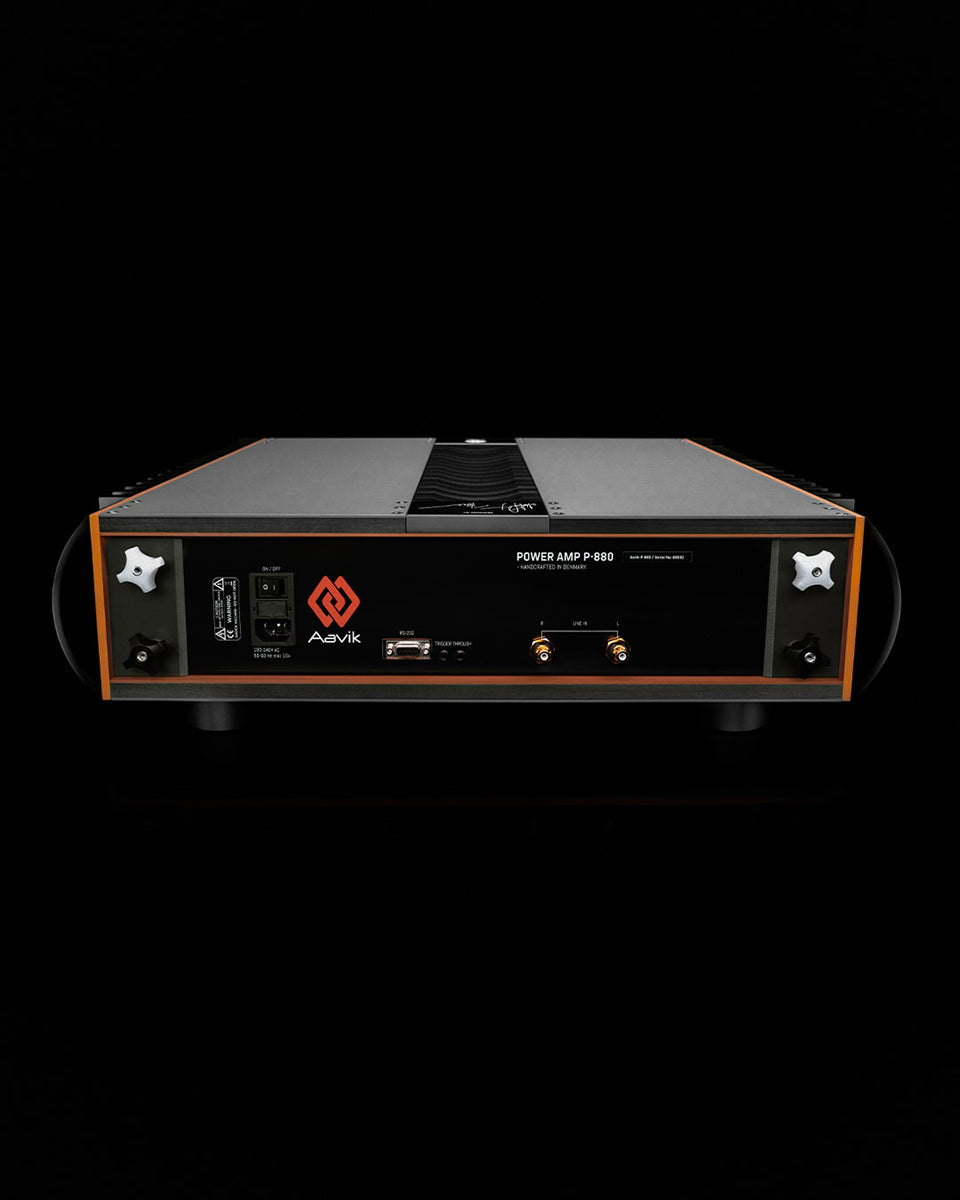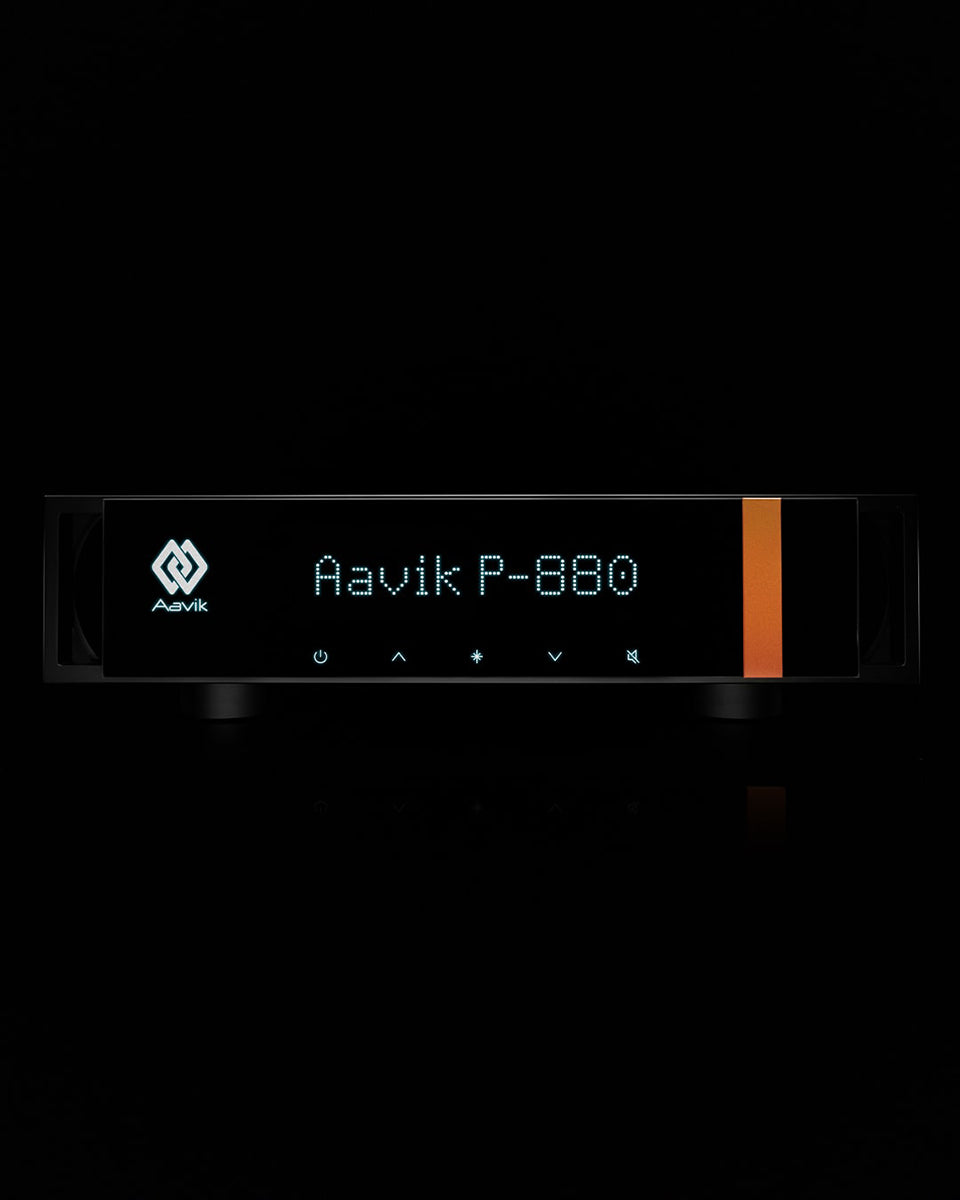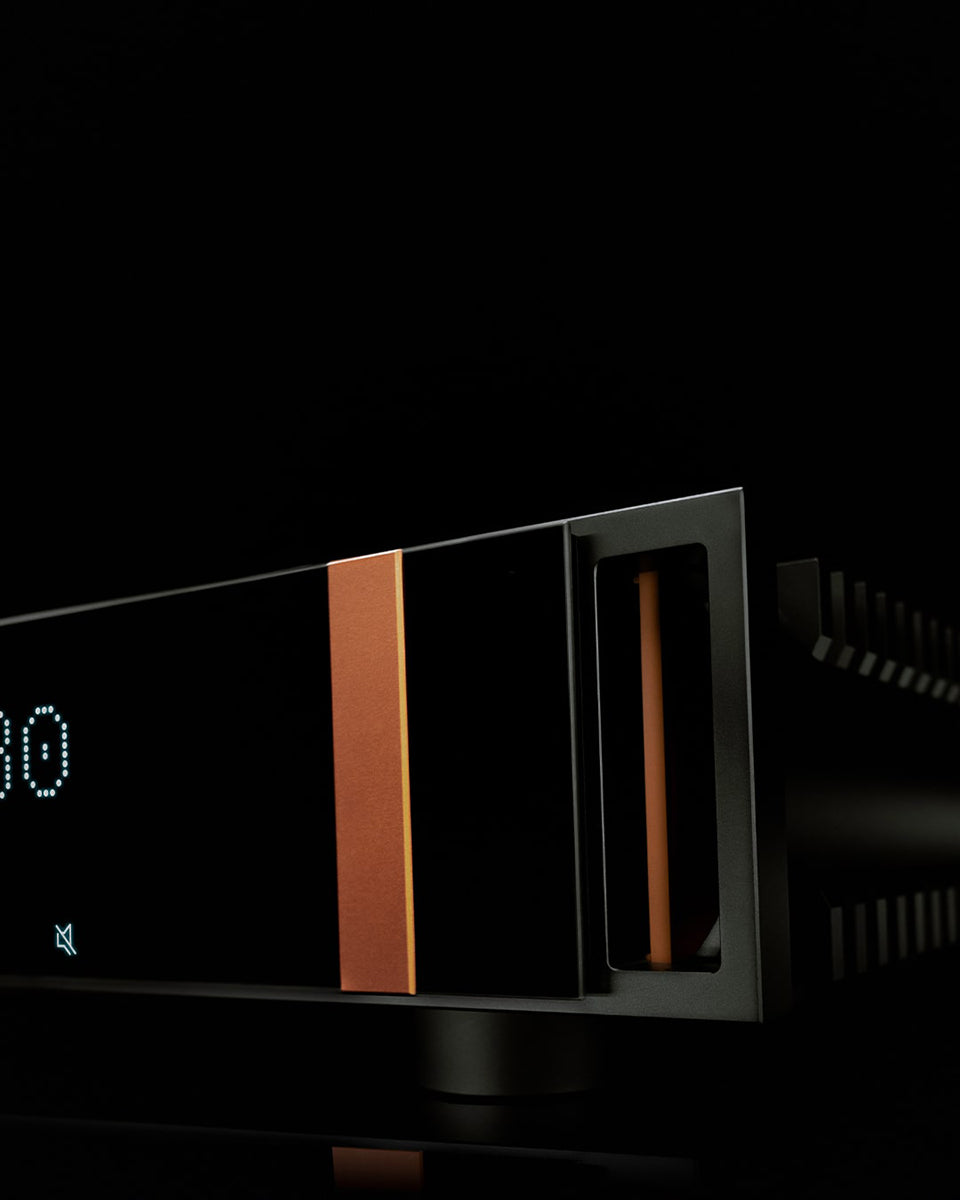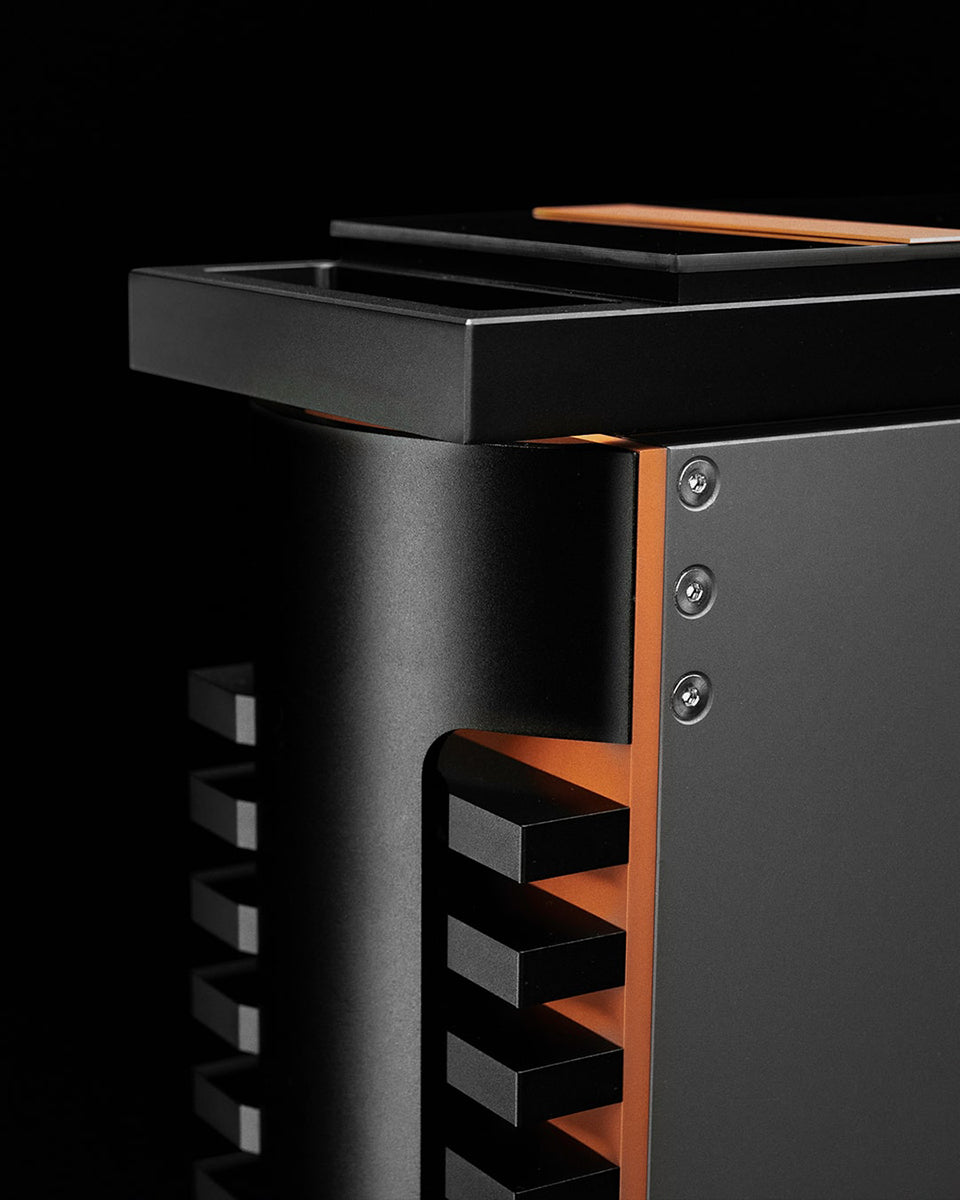Aavik
Aavik P-880 Power Amplifier
Please call our store to purchase:
904-642-6677

Aavik P-880
Power Amplifier

Powerful with a maximum of musicality
The primary development goal of the Aavik P-880 was to create a powerful non-switching pure class A power amplifier with the lowest possible output impedance that would contribute to a better signal and less noise, thus improving speaker performance, resulting in a much more organic sound and more musicality.
Through a long and intensive research and development process, Aavik’s engineering team identified several characteristic elements in the traditional Class A amplifier design that could be improved, which has had a very positive effect on the soundstage and musicality.

Technologies and Components
By dividing the Aavik I-880 integrated amplifier into separate pre- and control amplifiers, we have created the Aavik P-880 and the Aavik C-880. This seperation has reduces the noise floor, to an even lower level, refine the signal, and increase the power resources. Furthermore, this division has created space for new technologies, which have further contributed to a even larger sound stage with an extremely quite background.

Aavik 200W pure class A amplifier
Aavik have designed a circuitry that constantly keeps the bias spread 0,63 V above the required current, no matter where it is in the cycle. So, no matter how much current the power amp requires to perform, it always stays in Class A up to an impressive 2×200 W into 8 ohms, while at the same time not consuming unnecessary power.
This significant reduction in the power requirements of the amplifier allowed Aavik to design the capacitors as smaller units and place them locally, so that essentially each of the eight pairs of output transistors has its own capacitor bank right next to it. This means that the current does not have to flow through long wire harnesses and long circuit boards. The current is always directly at the output transistor, which means a shorter signal path and therefore less noise. In addition, this innovative Aavik design also means that the 880 amplifiers do not get as hot as conventional Class A amplifiers, resulting in higher efficiency.

Resonant mode power supply
This Aavik series is designed to ensure massive power resources with ultra-low noise. Unlike the square waves used by conventional switch mode power supplies, this Aavik series boast a resonant mode design which is principally driven by sine waves.
When more power is needed, the operating frequency increases, which, in turn, has the advantage that the power density also increases, thus allowing higher peak power when required by the music.
The noise floor in the raw power supply is extremely low but could be even further lowered by the ultra-low noise regulators supplying the different parts of the circuit. The noise of these regulators is measured in a few microvolts respectively nanovolts, which is significantly lower than the noise level of conventional regulators.
The principle of a traditional class A power supply is to create switching noise. This happens when the large capacitors have to absorb current from the transformer. Current can only flow into the capacitors when the voltage on the outside is less, so when current is needed, the voltage across the capacitors will be lower than the 50/60 Hz cycle. Although defined as a linear power supply, there are a lot of current transients flowing in these power supplies.
The Aavik 880 amplifier has four 500W power factor corrected resonant mode power supplies. The 500w power supplies combined with the extremely large power banks mean that the amplifier can deliver peak currents in excess of 80A, so it is not the power supply in the Aavik 880 amplifier that will limit how much you can feed into your speakers in transient and they will never switch .

The 880 cabinet design
A study of materials and shapes
The exterior design of the Aavik 880 amplifier is the result of Flemming Erik Rasmussen’s artistic and aesthetic work. However, his design philosophy is and always has been that design must serve purpose. The cabinet of the Aavik 880 amplifier was designed primarily with the goal of maintaining the best audio characteristics of the electrical design, i.e. the lowest inductance, reducing hysteresis to an absolute minimum, and ensuring excellent resonance control. In addition, since this was a Class A amplifier that was to be developed, there were some predefined premises for the design. With these goals in mind, the design process became a study of shapes and materials that opened up a unique and constructive synergy between Flemming Erik Rasmussen and Michael Børresen.
In addition, the amplifier features cooling elements on the sides and top that clearly bear Flemming’s design signature. The outer part of the volume button is covered with titanium, and the control panel is designed as a large LCD touchscreen display.
The choice of materials, as well as the interior and exterior design, are the result of Fleming and Michael’s collaboration and are characterized by functionality, but also by a very aesthetic and elegant design.

Bottom plate sandwich construction
The bottom plate is designed as a sandwich construction with a copper plate, a heavy compact laminate plate, and a titanium layer on the bottom. This unique sandwich construction ensures minimum resonance and supports a natural and organic sound.

The solid copper enclosure
Based on Flemming Erik Rasmussen’s fascination with copper for its visual appearance and feel, and Michael Børresen’s insight into the sonic properties of copper, this material was chosen as a fundamental component of the design. As a result, the Aavik 880 amplifiers feature a solid copper enclosure. This results in a further reduction in hysteresis, lower output impedance, lower inductance, a positive effect on the damping factor, and cooler operation of the amplifier. All these components ensure that the music is reproduced with more energy and power.

The Tesla coil principle
The principle is to have two coils that are wounded in each direction / a coil and a counter coil. In Ansuz words: “a double inverted coil” – the two coils are both carrying voltage – and when the Tesla coil encounters a voltage spike a counter spike is activated in order to eliminate the noise. As Noise spikes are pure voltage and carries virtually no charge, the cancelation is quite good, but not 100%. By adding more P-TC coils in parallel the performance increases. By implementing this the perceived blackness in the music improves significantly.
Ansuz Tesla coils are available in various types as they complement each other in terms of strengths /weaknesses.

Analog dither technology 3rd generation
A 3rd generation of the Ansuz analog dither technology has been developed. Analog dither technology originated in radar, where it ensured a stronger signal and thus greater range. The active Tesla coils send pulsating signals at precisely defined frequencies. These signals are sent in anti-phase. This significantly amplifies the musical signal and eliminates the background noise floor.
Analysis and studies have led to new options – and a lot of listening has resulted in this 3rd generation design which is a further optimization of the most effective frequencies which opens the soundscape even more and with the tiniest details when it comes to reproduction of the recordings.

Active Tesla coil
Effective noise killer.
The active Tesla coils are power supplied which secures a remarkable lower impedance and thus a better ability to eliminate noise. The active version is about three to four times more efficient than passive Tesla coils.

Active square Tesla coils
Impressive noise reduction.
The active square Tesla coils are embedded in our circuitry boards – one coil on the top and the counter coil on the rear side. The principle is exactly the same as the active Tesla coil and thus a great ability to eliminate noise than the passive Tesla coil.

Anti aerial resonance coil technology
Prevents airborne noise.
All cables and cable screens are acting like antennas for airborne RF noise which of course is a huge problem. The passive cable Tesla coil is wounded on the external part of the cable and protects the signal from absorbing the airborne RF noise. This noise is absorbed in the Tesla coil.
As there is a voltage running in the conductor itself, and it is wounded in the counter direction – this is used as the counter coil and the RF noise is then eliminated.

Active zirconium anti aerial resonance Tesla coil
Based on Ansuz general curiosity on the properties of different materials, Ansuz has implemented a zirconium bar in their anti aerial resonance coil design. This is another impressive upgrade to the Ansuz anti aerial resonance coil technology.
The properties of this zirconium bar allow for unprecedented resonance control resulting in outstanding musical refinement that creates a natural soundstage, unrivalled in its purity, precision and attention to musical detail.
Active zirconium cable anti aerial resonance Tesla coil
When Aavik designs new audio equipment, one of the main tasks is always to eliminate as much unwanted noise as possible to provide uncompromising musical authenticity. Therefore, Aavik always integrates the most effective Tesla coil technologies from the sister brand Ansuz into the Aavik products. Audio Group Denmark has learned that many technologically groundbreaking advances in product development of its three individual brands, Ansuz, Aavik and Børresen, can often be leveraged across brands. The knowledge and technology sharing that takes place between the three brands has proven to be extremely insightful and valuable.
Based on their studies of the properties of zirconium and their recent experience with the use of zirconium, Ansuz has also designed an active cable zirconium Tesla coil technology. The new design includes not less than three zirconium bars. Furthermore, the Tesla coil itself is extended as well. The complete solution is improving the signal handling dramatically – both in terms of eliminating noise and controlling resonances, ensuring a crystal-clear sound.
The active zirconium cable anti aerial resonance Tesla coils is wound directly on the out part of the cable and protects the signal from absorbing the airborne RF noise. This noise is absorbed in the Tesla coil. The active version is about three to four times more efficient than the passive cable Tesla coil

Switchless optical gain selection
LDR based.
The LDR (Light dependent resistor) is ultra quiet thanks to the switchless principle. The traditional MOS-FET switch arrays and relays create much more noise. They suppress subtle sound details and unnaturally color the tone.
Power Amplifier Technology Table
| Aavik P-280 | Aavik P-580 | Aavik P-880 | |
| Active Tesla coil | 72 | 108 | 182 |
| Active square Tesla coils | 168 | 240 | 411 |
| Dither Circuitry | 10 | 13 | 18 |
| Anti aerial resonance … | 4 | 4 | |
| Switchless Input Gain … | * | ||
|
Aavik Copper Inner Cha… |
* | * |
|
| Aavik Titanium Resonan… | * | ||
| Active zirconium Tesla… | 20 | ||
| Active zirconium cable… | 4 |
SPECIFICATIONS
Amplifier section |
|
| Output: |
2 x 250W 8 ohm
2 x 500W 4 ohm |
| Distortion (THD): |
<0,007% (10W, 1kHz, 8 ohm)
|
Aavik Noise Reduction |
|
| Active Tesla Coils: |
182
|
| Active Square Tesla Coils: | 411 |
| Dither circuitry: |
18
|
| Active zirconium anti aerial resonance Tesla coils: |
20
|
| Active zirconium cable anti aerial resonance Tesla coils: |
4
|
Power consumption |
|
| Standby: |
1W
|
| Idle: |
150W
|
Dimensions and Weight |
|
| L x W x H: |
580 x 510 x 155 mm
22 ⁵³/₆₄ x 20 ⁵/₆₄ x 6 ⁷/₆₄ inch |
| Weight: |
41 kg
90,4 lbs |
